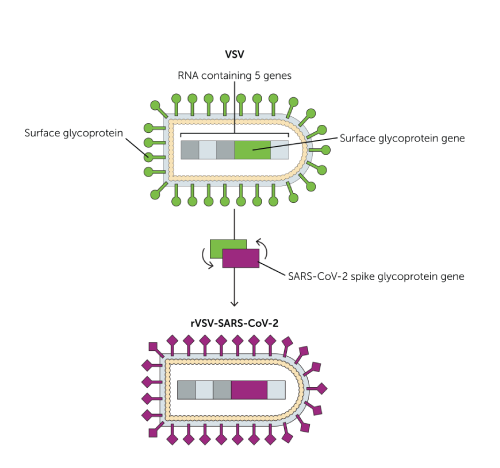November 6, 2020
Participant Enrollment Begins for Phase 1 Trial of IAVI-Merck COVID-19 Vaccine Candidate
The study will assess the safety, tolerability, and immunogenicity of SARS-CoV-2 vaccine candidate V590 compared to placebo.
Update, 1/25/21: IAVI and Merck, known as MSD outside the United States and Canada, announced they are discontinuing development of the SARS-CoV-2 vaccine candidate V590. This decision follows review of findings from a Phase 1 clinical study. In this study, intramuscular administration of V590 was generally well tolerated, but the immune response was inferior to those seen following natural infection and to those reported for other SARS-CoV-2 vaccines. IAVI and Merck will work together to continue research into vaccine candidates to prevent COVID-19.
A Phase 1 clinical trial of the IAVI-Merck (known as MSD outside the United States and Canada) SARS-CoV-2 vaccine candidate V590 has begun enrolling participants. The randomized, placebo-controlled double-blinded trial is being conducted at seven sites in the U.S. and will include up to 252 participants ages 18 and up, including seniors. This vaccine candidate uses the recombinant vesicular stomatitis virus (rVSV) technology that IAVI has developed through its long-standing research program on an rVSV-based HIV vaccine candidate as well as rVSV-based vaccines for other emerging infectious diseases such as Lassa fever and Marburg virus disease.
Merck is the sponsor of the trial, which is called V590-001. IAVI has partnered with Merck on trial design and site selection, and the IAVI Human Immunology Laboratory at Imperial College London is conducting a panel of immunogenicity assays to assess certain aspects of immune responses to the vaccine.
 VSV is altered to make the rVSV-based SARS-CoV-2 vaccine candidate
VSV is altered to make the rVSV-based SARS-CoV-2 vaccine candidateThe study will assess the safety, tolerability, and immunogenicity (the level of antibodies that target the virus) of V590 compared to placebo. At enrollment, most participants must have no evidence of previous infection by SARS-CoV-2 — that is, they must have no detectable anti-SARS-CoV-2 antibodies at the time they are screened for the trial. One small group of the trial will include participants who have detectable anti-SARS-CoV-2 antibodies but have a negative viral test and have had no symptoms associated with COVID-19 for the past three weeks. If this or any SARS-CoV-2 vaccine candidate is licensed and deployed widely, it is likely that people who have experienced previous infection with SARS-CoV-2 will be vaccinated, and so assessing safety in this population is important.
Participants will be monitored for safety and immune responses for a year after vaccination, though interim results will be available sooner. Depending on those interim results, a Phase 2/3 trial could follow in early 2021.
Dagna Laufer, M.D., vice president and head of clinical development at IAVI, noted that the Phase I trial is not designed to test whether the vaccine candidate prevents COVID-19 disease or blocks infection with SARS-CoV-2. She said, “This Phase 1 trial will help us make decisions about moving ahead with clinical development of this vaccine candidate and at what dose. We hope to see robust immunological responses and a favorable safety profile — together, these signals could tell us that further clinical research is warranted.”
The two organizations announced their partnership to develop the rVSV-SARS-CoV-2 vaccine candidate on May 26, 2020. IAVI’s development of V590 was done by scientists at IAVI’s Vaccine Design and Development Laboratory (DDL) in Brooklyn, New York, a leading viral vector vaccine research and development lab known for innovation and generation of novel vaccine concepts. Nonclinical research on the vaccine continues at the DDL and at Merck. Merck will lead regulatory filings globally. Both organizations will work together to develop the vaccine and make it accessible and affordable globally, if approved.